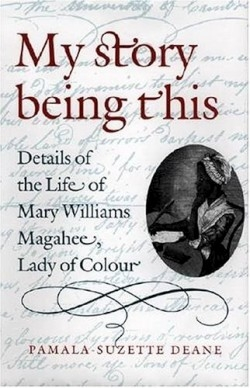My Story Being This
Details of the Life of Mary Williams Magahee Lady Of Colour
Mary, a literate fugitive slave living amongst other blacks in the territory of Rhode Island, has decided to keep a journal. Each entry begins with the day, date, and description of the weather followed by a synopsis of her thoughts and feelings about rumors she hears from neighbors and friends. The fictional journal, dated from June 1, 1771 to May 4, 1776, offers details of Mary’s life including her brief acquaintance with her mother who “took hot coals to her own face” in a desperate attempt to thwart her master’s advances toward her. It continues with Mary’s description of her subsequent escape to freedom alongside her father. Though the two were separated for two years, they reunited in Rhode Island and Mary devoted herself to taking care of him during his final years.
The novel focuses on the black community, which seems fairly isolated and self-contained, nominally free, yet not without racism or strict parameters, as most of the black characters are slaves, domestic workers, or manual laborers. The author makes few comments about how whites live and interact with blacks, though she does mention larger historical figures and events such as George Washington, Thomas Paine, Crispus Attucks, Phillis Wheatley, the Boston Tea Party, and the Black regiment of soldiers from Rhode Island who fought during the American Revolution. These references lend authenticity to the book.
Deane, who has published a number of essays and award-winning short stories, skillfully intertwines other slave narratives into this novel, as Mary attempts to document her own story. Known to the “Enclafe” as a teacher or private tutor, Mary is asked by a number her acquaintances to record their tales as well. Many of these narratives read like brief slave stories, as the narrators attempt to elucidate the horrors of slavery. Why they would seek an audience beyond Mary is not made clear; nevertheless, the strength of the book rests on these tales.
Mary lives a simple life, so her chain of journal entries may prove mundane and inconsequential to some readers. The dialect of uneducated slaves, though a very insignificant part of the book, may be difficult for some to read and somewhat offensive to others. However, Deane’s careful research and meticulous attention to details important to the historical period shines through and will be appreciated by those interested in colonial Rhode Island or the lives of blacks living in what has been traditionally and erroneously referred to as a free society in the North.
Reviewed by
Kaavonia Hinton
Disclosure: This article is not an endorsement, but a review. The publisher of this book provided free copies of the book to have their book reviewed by a professional reviewer. No fee was paid by the publisher for this review. Foreword Reviews only recommends books that we love. Foreword Magazine, Inc. is disclosing this in accordance with the Federal Trade Commission’s 16 CFR, Part 255.

